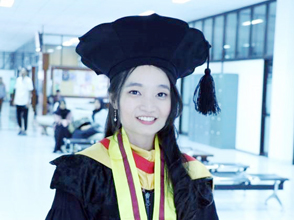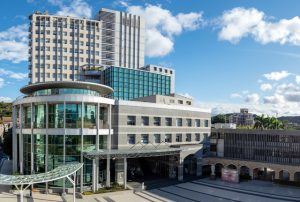長期以來,人們一直在研究免疫系統保護人體免受疾病進一步發展所扮演的角色,皮膚和黏膜是人體的第一道屏障,因此即使我們經常接觸許多具傳染性的細菌和病毒,也不會三天兩頭生病。免疫細胞和抗體進一步組織一系列反應,旨在消滅進入我們身體的病原體,同時還能防止傷害「自身」組織。簡單來說,「先天的」免疫力會對任何外來的病原體迅速反應,接下來「適應的」免疫系統就可以瞄準特定的病原體並且消滅它。
 Laurensia Denise Utami Putri身為一個來自熱帶國家印尼的醫學博士,我經常發現傳染病患者具有明顯的特徵與症狀,有些人病得很重,而有些人幾乎沒有任何症狀,在我了解到免疫系統不只在發病時發揮著至關重要的作用,而且在疾病進展和對治療的反應中也扮演極其重要的角色,從而激發我進一步研究免疫學的興趣。【左圖:Denise老師是第一位獲得印尼日惹大學(Gadjah Mada Univesity)與北醫雙博士學位的研究生】
Laurensia Denise Utami Putri身為一個來自熱帶國家印尼的醫學博士,我經常發現傳染病患者具有明顯的特徵與症狀,有些人病得很重,而有些人幾乎沒有任何症狀,在我了解到免疫系統不只在發病時發揮著至關重要的作用,而且在疾病進展和對治療的反應中也扮演極其重要的角色,從而激發我進一步研究免疫學的興趣。【左圖:Denise老師是第一位獲得印尼日惹大學(Gadjah Mada Univesity)與北醫雙博士學位的研究生】
我在臺北醫學大學攻讀博士學位,在此我學習到蛋白質體學分析,一種從單個細胞中剖開蛋白質概況的先進而有力的方法,採用蛋白質體學,我們研究巨噬細胞(先天免疫的傭兵之一)對熱殺死的結核分枝桿菌刺激的反應,並提出其在肺癌環境中啟動的分子機制,蛋白質體學同時還可以作為研究多種免疫細胞表達和活性的一種方法,我們的研究指出接受化療的肺癌患者免疫細胞特徵,包括T細胞、B細胞、單核細胞和NK細胞,可能預測疾病無惡化存活期。
 由於傳染性疾病的本質,新冠肺炎(COVID-19)以其廣泛傳播而受到全球關注,除了新型病原體之外,研究還導向揭示宿主的免疫反應,從而發現預防性疫苗和治療方法。我們的團隊之前繪製一個免疫細胞圖譜,模仿COVID-19患者中的嚴重感染者,這些患者呈現長時間的病毒陽性(長達76天),儘管他們在整個病程中都表現出輕微的症狀,採用多面板流式細胞術檢測,我們還發現末期腎臟病患者的B和NKT細胞對COVID-19疫苗有明顯的延遲反應。最近還發現康復患者的炎症細胞激素分泌減弱以及T細胞數量減少,這應該提高人們對COVID-19 感染後隱匿性免疫失調和衰竭的可能性的警惕。【右圖:Denise老師在北醫大攻讀時,曾在105學年度師生聯合學術研究發表會中,獲得最佳海報展示獎】
由於傳染性疾病的本質,新冠肺炎(COVID-19)以其廣泛傳播而受到全球關注,除了新型病原體之外,研究還導向揭示宿主的免疫反應,從而發現預防性疫苗和治療方法。我們的團隊之前繪製一個免疫細胞圖譜,模仿COVID-19患者中的嚴重感染者,這些患者呈現長時間的病毒陽性(長達76天),儘管他們在整個病程中都表現出輕微的症狀,採用多面板流式細胞術檢測,我們還發現末期腎臟病患者的B和NKT細胞對COVID-19疫苗有明顯的延遲反應。最近還發現康復患者的炎症細胞激素分泌減弱以及T細胞數量減少,這應該提高人們對COVID-19 感染後隱匿性免疫失調和衰竭的可能性的警惕。【右圖:Denise老師在北醫大攻讀時,曾在105學年度師生聯合學術研究發表會中,獲得最佳海報展示獎】
我計劃繼續從事接近臨床需求的研究,尤其是與肺部疾病相關的研究,包括COVID-19、肺結核和肺癌,我有興趣進行更多可以產生意義和應用成果的轉譯研究,更快、更有效地將基礎科學發現轉化為實際應用。(文/Laurensia Denise Utami Putri,醫學院臨床醫學研究所助理教授)
The immune system has long been studied for its role in protecting the human body from disease development. Physical barriers such as skin and mucosal membranes serve as the first protector so that we don’t get ill every other day, even though many infectious bacteria and viruses frequently come into contact with us. Immune cells and antibodies further orchestrated a series of responses with the aim to eliminate pathogens that gain entry into our body, while also preventing harm to ‘self’ tissue. In brief, the “innate” immunity responded rapidly to any pathogen encounter, and the later “adaptive” immunity performed specific and targeted elimination of the pathogen.
Graduating as a Medical Doctor from Indonesia, a country with a tropical climate, I commonly found patients with infectious diseases presenting with distinct signs and symptoms, some being critically ill, while some barely reporting any. It is when I learned that the immune system plays a vital role not only in pathogenesis but also in disease progression and response to treatment, thus driving my interest to study further about immunology.
I did my PhD at Taipei Medical University, where I got acquainted with proteomics assay, an advanced and powerful method to dissect the protein landscape from a single cell. Adapting proteomics, we studied the response of macrophage, one of the innate immunity’s mercenaries, to heat-killed Mycobacterium tuberculosis stimulation, and proposed a molecular mechanism for its activation in a lung cancer setting. Proteomics can also serve as an approach to studying the expression and activity of multiple immune cells at the same time. We reported immune cell signatures which include T cell, B cell, monocytes, and NK cells, in lung cancer patients receiving chemotherapy which may predict progression-free survival.
With the nature of communicable diseases, COVID-19 came to global attention with its widespread transmission. Other than the novel pathogen, studies are directed at unraveling the host’s immune responses, which lead to the discovery of preventive vaccines and therapeutic approaches. Our team previously mapped an immune cell landscape mimicking those with severe infection in COVID-19 patients presented with long viral positivity (up to 76 days), although they showed mild symptoms throughout the course of the disease. Adapting multi-panel flow cytometry assay, we also discovered distinct B and NKT cell responses in end-stage renal disease patients with delayed response to COVID-19 vaccination. We also recently discovered attenuated inflammatory cytokine secretion along with low T cell number in recovered patients, which should raise cautiousness to the possibility of occult immune dysregulation and exhaustion following COVID-19 infection.
I plan to continuously engage in studies that are close to the clinical needs, especially those related to pulmonary diseases including COVID-19, Tuberculosis, and lung cancer. I would be interested in conducting more translational research which could produce meaningful and applicable results, translating basic science discoveries more quickly and efficiently into practice.

